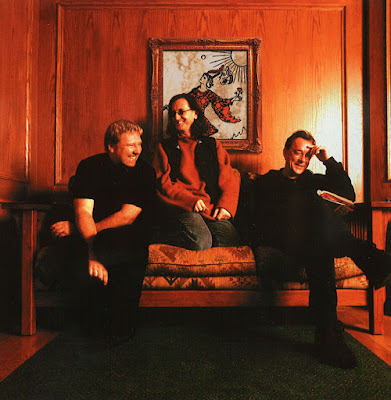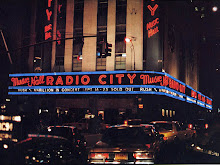In Rush, the focus has always been on the music -- where the band themselves write (Alex & Ged the music, Neil the lyrics), record, and perform all of their own material. It's never been about partying, drugs & sex (unless Kiss is touring with you, of course), or any of the sort of garbage that was more typical of Axl Rose and his camp.
To function like the well-oiled machine Rush is, not only did it involve talent and discipline, but also the simple matter of just getting along -- probably the #1 reason bands don't stay together. In the case of Alex, Ged & Neil, by all accounts egos never got in the way, which was spearheaded by the fact that the drummer in this band also happened to be the lyricist -- a situation that forced a partnership with the band's singer, to edit the words and shape them into a final form with the vocal delivery.
Rush are the example of positive band dynamics in the rock world....and one of the hardest working bands out there, essentially touring and putting out recordings nonstop since the early 70s. Writing, recording, rehearsing, tour, break. Rinse and repeat year after year. Winning over audiences one show at a time. Establishing themselves more like the Mt. Rushmore of rock than Rush -- the definition of a solid and enduring rock band that shines on record -- and even brighter live onstage.
For God's sake, Rush were indestructible. Literally. Nothing could stop them. Ever. They're immortal.
Or so we thought.
 Almost immediately following the band touring off Test for Echo
in the summer of 1997, drummer Neil Peart tragically lost his daughter
Salina in a car accident in Toronto that August....and if that wasn't
enough heartbreak and tragedy to contend with, approximately one year
later his wife Jackie succumbed to cancer. From a fan's perspective, stuff that was as strange and random as it was horrific and unimaginable. Sad times.
Almost immediately following the band touring off Test for Echo
in the summer of 1997, drummer Neil Peart tragically lost his daughter
Salina in a car accident in Toronto that August....and if that wasn't
enough heartbreak and tragedy to contend with, approximately one year
later his wife Jackie succumbed to cancer. From a fan's perspective, stuff that was as strange and random as it was horrific and unimaginable. Sad times.Having followed the band as an ardent fan since the early 1980s, I can still feel the emotions from these series of events to this day.
Needless to say, these tragedies put the band instantly on hiatus. The whole machine, in which everyone was like a large family, shut down. The thought of them continuing seemed like a far cry, and frankly it was more of an afterthought since everyone was more concerned about Neil in his recovery and how he was doing -- fans like myself included.
As far as I was concerned, fuck the band -- our brother Neil needed our support, any way we could provide it -- be it posts to the band's website, emails, or care packages sent by parcel to the Anthem Records office in Toronto.
"No Neil, no Rush." Geddy Lee signaled to fans at some point during these events. He would later state: "I don't want to play in Rush with anyone else. It is the band, the three of us."
As Neil's coping and way of sorting through all of it, he hopped on his motorcycle and zigzagged all over the North American continent, covering over 40,000 miles when all was said and done -- these journeys were later chronicled in his book Ghost Rider. Guitarist Alex Lifeson and singer/bassist/keyboardist Geddy Lee (after a long break themselves) eventually took on projects of their own. Alex engineered a recording for a band out of Mississippi called 3 Doors Down and dabbled into other projects. Ged put out his first solo project of his career in 2000, My Favorite Headache -- a good CD that's worth your time and money. Interestingly, it sounds very Rush-y, with Ben Mink sounding rather Alex-y on guitar. I can't speak for all Rush fans, but I have always thought of it as the "lost Rush recording" that probably would have been a Rush record under different circumstances.
Then, after a few years, someone we all know and love resurfaced, claiming he needed "gainful employment" again.
Hello, Neil. Welcome back.
Around late 2000, grumblings in the Rush camp began to surface about the boys getting together to record a new project. Then sometime in 2001 the news came around that they were writing, then in the studio. Then, in early 2002, "One Little Victory" hit the airwaves, signaling Rush's return with an opening drumming fervor that sounded like an octopus spinning out of control.
Released in May, Vapor Trails was the miracle nobody thought they'd ever have the privilege to hear. It was followed by a world tour marking the band's glorious return, and ended with them performing in front of 50,000 fans in Rio de Janiero going completely mental -- check out Rush in Rio for that.
With all the circumstances leading up to and surrounding it, it's of no surprise that Vapor Trails is a very unique animal in the Rush canon -- not necessarily in a sonic sense as much as the theme and tone of the recording -- deeply raw and personal.
Sonically, the band maintain the slow evolution of the heaviness and edge that began to evolve in earnest with 1993's Counterparts and continued on 1996's Test for Echo. VT is even heavier, to the effect that some of Alex's guitarwork takes on almost more of a punk rock attitude.
Indeed, this record is all about tone and 'tude. The music is driven by the themes Neil was grappling with at the time -- and while much of it focused on rebirth, self-examination and discovery through love -- there's absolutely no way the recording can NOT cross paths with the loss and sadness of what had taken place in recent years. In particular, "Ghost Rider," "Vapor Trail," and "Earthshine" grapple with the latter. In particular with "Ghost Rider," Ged's opening bass line sets a tone for the tune, singing on its own in a mournful sadness and highlighting the genius that Ged has become known for on that instrument. Like a knife through butter.
As would be expected, the musicianship on VT is second to none, however there were a few rules in place going into recording it. First off, Alex imposed a policy on himself that he would not solo on the record -- but this triggered a new idea -- there would be sections of songs where the whole band would solo together. This limitation turned to band jam by design is one of the more unique and endearing aspects of VT in the Rush catalog.
Alex and Geddy have always been genius when it came to "decorating" Neil's lyrics, as Peart has stated in the past....and certainly VT is all about the themes and the lyrics, which drive the record.
For all the beatings I've seen Peart take over the years for his obscure lyrics (most unfounded, a few not) from so-called music reviewers, I fail to see how he isn't brilliant with his words on VT. He takes deeply personal themes in which he's able to impart and echo sentiments and details from his tragedies and recovery -- yet frames them is such a way that makes them applicable not just to what was on his mind, but also relatable to a wide listening audience. He does it with all the hallmarks of the Peart voice; inventing his own metaphors, witty rhymes, and by taking ideas from other writers by repurposing their words into his own lyrical puzzle. Then it's channeled through Ged's beautifully unique vocal delivery, where he sings so convincingly that you'd think he'd written them himself.
Since VT marked the band's return to recording after a long hiatus, it also meant that they needed time to get back into a form that would meet their expectations and be worthy of the Rush brand. Plus, Alex and Ged simply wanted to give Neil all the time he needed, with no pressure. It was enough that he was back, and simply a contributing member of the band. With the extra time being part of the plan, it spanned over a year (if I recall correctly) in which they rented out a warehouse to jam together and reorient themselves, then booked studio time.
While the circumstances dictated as such, the down side to taking the extra time was that when the recording of VT was finally complete, the band let loose the controls and handed the engineering and mixing over to other folks. Typically Alex was involved and supervised the engineering portion of the process, but in this case everyone took a much-needed break.
Unfortunately the result was a recording that sounds very dull and muddy, which is way below the standard that Rush is known for. When first released, I recall something to this effect but didn't initially have much of a complaint since I was more focused on the material and simply elated that they had even put something out in the first place.
However, as time went on and the band put out other recordings, I found myself coming back to VT less often....and I have to admit this is due in part to the muddy production of the recording. Many fans in the Rush camp, who were used to the high standards of recording quality from the band, also called out the substandard production as well.
I know Rush enough to realize that they're a band who not only prides on high quality in recording and musicianship from themselves, but also listens to the pulse of their fan base.
So, in an effort to make things right, the band remixed Vapor Trails and released this version in 2013 to much higher reviews and acclaim. It's also available as part of the Atlantic era box set covering Presto (1989), Roll the Bones (1991), Counterparts (1993), Test for Echo (1996), Vapor Trails remixed (2002/2013), Feedback (2004), and Snakes & Arrows (2007). All of these recordings are also now available individually on vinyl in limited editions.
The remixed version is not perfect. There are added guitar solos to "One Little Victory" for example, which I personally didn't find necessary and sound a bit forced -- especially considering how adamant Alex was about not soloing in the original recording sessions in 2000-01.
I'd been meaning to write a review of this record for years, as it marks the rebirth of this great band. From the pain and rebirth seeping out of Vapor Trails, Rush would go on to enjoy a historic renaissance over the next 15 years -- recording three more albums (two of original material, another EP of covers to celebrate their 30th anniversary), even more live recordings, perform live with strings, have a documentary filmed about them, enjoy an entry in to the Rock Hall in 2013 -- then capping it all off with a 40th anniversary tour in 2015 before seriously contemplating a well-earned retirement.
To get a true feel for this recording, a completest would need to hear both versions. For someone new to it, I have to point them towards the remixed version....small differences or an extra guitar solo added here or there aside, the sound quality and production definitely trumps.
However, there's something to be said about the original, despite the lackluster and muddy production. The rawness....the themes of sadness, anger, confusion, then rebirth that capture the essence of Vapor Trails....the unselfishness and exercised sensitivity with Alex's policy to not solo on the record, out of consideration for his drummer and brother....and that opening drum assault that brought a collective tear to the eye of all Rush fans -- the original version echoes all of this at its finest. To those fans who lived through this phase of the band and understood the story leading up to this recording, the original captures the mood and essence of what the band -- Neil especially -- was going through at the time.
Album highlights: One Little Victory, Ghost Rider, The Stars Look Down, How it Is, Vapor Trail, Secret Touch, Earthshine


























1 comment:
I first heard Rush on K7 tape (copy of a copy). I always loved to search for bootlegs of RTB tour and Counterparts back in the 90', so I never had a problem with the quality of VT. Always loved the record, for me one of their best albuns. When this nonsense of remixing the album started many years ago, with people talking about drums distortion and blah, blah, blah... Reminded me os Star Wars and its new scenes, nothing good can come out of this. Well thats my opinion.
Post a Comment